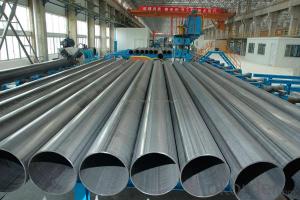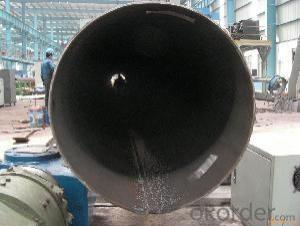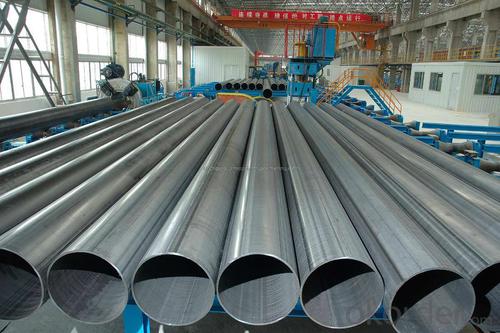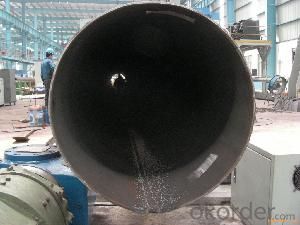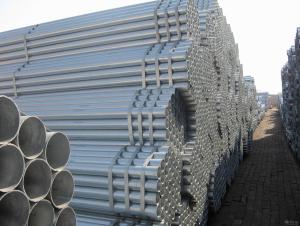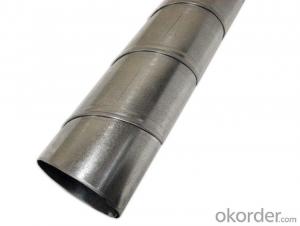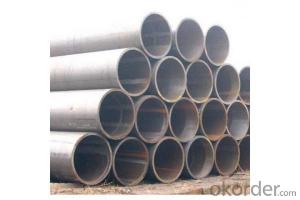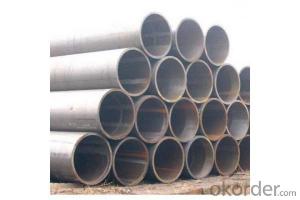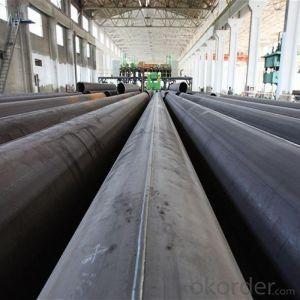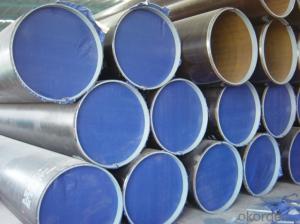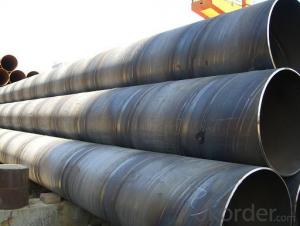LSAW STEEL PIPE CARBON STEEL PIPE 48''
- Loading Port:
- China Main Port
- Payment Terms:
- TT OR LC
- Min Order Qty:
- -
- Supply Capability:
- -
OKorder Service Pledge
OKorder Financial Service
You Might Also Like
Packaging & Delivery
Packaging Detail: | Normal exporting packing,in container or bulk vessel or as per clients' request |
Delivery Detail: | 2 months after confimed contract |
Specifications
Large Diameter API 5L X70 PSL2 LSAW Steel Pipe
Grade: X42, X46, X50, X52, X60, B, C
OD: 1.5"-28"
WT: SCH10-SCH160
Brand:TPCO
Large Diameter API 5L X70 PSL2 LSAW Steel Pipe
Specifications:
u Standard: API 5L
u Grade: B, C, X42, X46, X50, X52, X56, X60, X65, X70, X80
u OD: 1.5"-28"
u WT: SCH10-SCH160
u Length: 5-12m
u Ends Finish: plain end, bevel end, grooved end
u Surface Treatment: bare, black varnished, oiled finish, red color, anti-corrosion, 3PE, FBE or epoxy coating
u Technique: hot rolled or cold drawn
u Application: api 5l steel pipe for conveying oil, water, gas
u Invoicing: based on theoretical weight or actual weight
u Payment Terms: L/C at sight, T/T or Western Union
u Trade Terms: FOB, CFR, CIF
u Certification: ABS manufacturing assessment, ABS design assessment, API 5CT, API 5L, DNV manufacturer certificate, ISO9001 quality management system certificate, ISO14001 environment management system certificate, GB/T28001 occupational health and safety management system certificate, A1 class manufacturing license of special equipment certificate, CCS, GL, LR, SGS, TüV, PDE
- Q: What material is RHS in the steel tube?
- The CHS structure represents thin-walled round steel tubes, in which materials are referred to Taiwan CHS's steel and are used to indicate the series of anti rust paints used in metal materials.
- Q: Can steel pipes be used for underground electrical conduits?
- Yes, steel pipes can be used for underground electrical conduits. Steel pipes are durable, strong, and resistant to external forces, making them suitable for protecting electrical wiring in underground installations. Additionally, steel pipes offer excellent corrosion resistance, ensuring the longevity and safety of the electrical system.
- Q: How do you join two steel pipes together without welding?
- One common method to join two steel pipes together without welding is by using mechanical fittings or connectors. These fittings are designed to connect pipes securely without the need for welding. Here are a few options you can consider: 1. Threaded Fittings: Threaded fittings have male and female threads that enable you to screw them together. To join the pipes, you will need to cut the ends of the pipes to create male and female threads. Apply thread sealant to ensure a tight and leak-free connection. 2. Compression Fittings: Compression fittings consist of a nut, a compression ring, and a compression seat. These fittings are designed to create a tight seal by compressing the ring against the seat. Simply slide the compression ring and nut onto the pipe ends, and use a wrench to tighten the nut until it forms a secure connection. 3. Flange Connections: Flange connections involve using flanges, which are flat plates with bolt holes, to join the pipes. The flanges are bolted together using gaskets to create a tight seal. This method is commonly used for larger diameter pipes or in situations where frequent disassembly may be required. 4. Grooved Couplings: Grooved couplings utilize a mechanical coupling housing with two grooved ends that fit over the pipe ends. The coupling is then secured using bolts or screws, which tighten the housing around the pipe ends, creating a secure connection. This method is often used in plumbing and fire protection systems. Before deciding on a method, it is crucial to consider the specific requirements of your application, such as the pipe diameter, pressure, and temperature. Additionally, ensure that the chosen method complies with relevant industry standards and regulations to ensure a safe and reliable connection.
- Q: How are steel pipes handled and transported safely?
- Steel pipes are handled and transported safely by following certain procedures. They are usually lifted and moved using cranes or forklifts that have the appropriate capacity to handle their weight. To prevent damage during transportation, pipes are secured in sturdy containers or bundles, often by using straps or chains. In some cases, protective coverings or caps are used to shield the ends from any potential damage. Additionally, proper stacking techniques are employed to ensure stability and prevent accidents during transportation.
- Q: Can steel pipes be painted or coated?
- Certainly, steel pipes have the capability to undergo painting or coating procedures. It is a prevalent method employed to safeguard them against corrosion, enhance their visual appeal, or comply with particular industry standards. The process consists of an initial step of diligently cleaning the pipes to eliminate any dirt, grease, or rust. Subsequently, a primer is applied, followed by the desired paint or coating. The selection of paint or coating is contingent upon the envisioned purpose of the pipes. For instance, epoxy coatings are frequently utilized for water or wastewater pipelines, while high-temperature resistant coatings are employed for pipes utilized in industrial environments. In conclusion, the act of painting or coating steel pipes has the potential to augment their resilience and overall performance.
- Q: What is the load-bearing capacity of steel pipes?
- The load-bearing capacity of steel pipes depends on various factors such as the diameter, wall thickness, and grade of the steel used. Generally, steel pipes have high load-bearing capacity due to their inherent strength and durability. The load-bearing capacity can be determined through engineering calculations and testing methods. These calculations consider factors like the applied load, pipe dimensions, and the material properties of the steel. It is important to consult engineering standards and guidelines, as well as a structural engineer, to accurately determine the load-bearing capacity of specific steel pipes for a given application.
- Q: Can steel pipes be used for conveying hazardous materials?
- Yes, steel pipes can be used for conveying hazardous materials due to their high strength and resistance to corrosion.
- Q: What are the advantages of using stainless steel pipes?
- There are several advantages of using stainless steel pipes. Firstly, stainless steel pipes have excellent corrosion resistance, making them suitable for various industries, including water supply, chemical processing, and oil and gas. Secondly, they have high strength and durability, allowing them to withstand extreme temperatures and pressure. Additionally, stainless steel pipes are hygienic and easy to clean, making them ideal for applications in the food and beverage industry. Lastly, they have a long lifespan and require minimal maintenance, resulting in cost savings in the long run.
- Q: How are steel pipes used in construction?
- Steel pipes are commonly used in construction for various purposes such as structural supports, plumbing systems, and underground utility installations. They provide strength, durability, and flexibility, making them suitable for carrying fluids, gases, and structural loads. Steel pipes are often used in the construction of buildings, bridges, and infrastructure projects, ensuring reliable and long-lasting performance.
- Q: How are steel pipes protected against rust?
- Steel pipes are protected against rust through various methods such as galvanization, epoxy coating, and using corrosion-resistant alloys.
Send your message to us
LSAW STEEL PIPE CARBON STEEL PIPE 48''
- Loading Port:
- China Main Port
- Payment Terms:
- TT OR LC
- Min Order Qty:
- -
- Supply Capability:
- -
OKorder Service Pledge
OKorder Financial Service
Similar products
Hot products
Hot Searches
Related keywords
